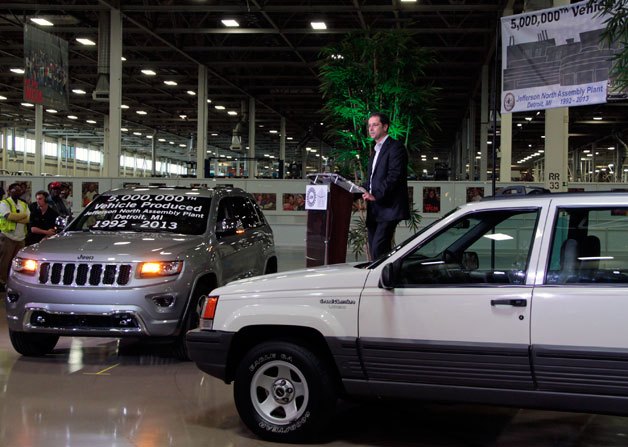QOTD: Skin In The Game
With negotiations between the UAW and the Big Three set to open next year, FCA head Sergio Marchionne has already fired the first shots, calling for an end to the two-tier wage system and a new pay structure, tied to profit-sharing.
Speaking to Reuters, Marchionne discussed his plan to eliminate the two-tier structure, replacing it with a yet-untested system
“The way you do this is you grandfather the Tier 1s,” Marchionne said of the veteran workers. “You make them a dying class and you build a Tier 2 structure that sets the wage mechanism for the next generation.
“When you have a bumper year, you pay them as much as a Tier 1 would make if not more,” he added of the lower-tier wage scale. “But if I’m in the toilet because the markets are down or GM is successful, or Ford, and then we go down in earnings, then I think at the end of the day you share the pain with the company.”
While the UAW did not comment on Marchionne’s proposal, the UAW has historically been against two-tier wages as well. In my view, Marchionne’s proposal is interesting, in that it lets the hourly workers have some “ skin in the game” when it comes to their own financial success, as well as a feeling of pride and accomplishment when FCA succeeds. Given that FCA’s American units like Jeep and Ram are practically carrying the company, the intangible elements would be a strong motivator – of course, it also leaves workers exposed to managerial incompetence, the prospect of other business units dragging down overall performance or both. Let us know what you think in the comments.
More by Derek Kreindler


































Comments
Join the conversation
As I've stated I like what Sergio has done, he's appears to be good at business. Trying to entice the blue collared workers to accept risk with the UAW will be hard. I don't think the UAW will buy into Sergio's plan and there will be problems. Imagine a person working and earning more or less to how productive they are? The reality is the blue collared workers must realise the risk that the UAW has presented to them. A simple way to look at his is by the use of evidence that is credible and verifiable. I would use the foreign manufacturers in the US for this. If we use them we will see that the model they are using has less risk. The foreign manufacturers didn't require a bailout and they do maximise the socialist pandering and protectionism as well as the Detroit manufacturers. But I do think overall that the blue collar workers at these 'foreign' plants do accept more risk and manage it better. The UAW tries to impose anti-risk policies and guidelines thinking it is protecting it's workers, but at the end of the day look at the city of Detroit and the Detroit manufacturers and tell me who has the best business model for managing vehicle production in NA. To me the UAW promote the most destructive form of capitalism. That is to want what a 'captialist' has. But they want this without taking any risk. To the UAW clowns out there. To improve you lives you must take risk and when you screw up it isn't the general populace that has to pickup the pieces. This ideal you have only encourages more failure with less productivity and progress. You are the luddites of the modern world.
If union workers want more than basic wage, they need to buy stock like the rest of us or negotiate for stock awards/options. We can't coddle these union people from cradle to grave, and bail out their pensions and healthcare, while giving them SS checks and MED benefits as well.
I don't see how profit can be a performance metric when the line worker is not making decisions that affect profit. I understand basing bonuses on quality control or other areas where the guy on the line can control. This will likely have no impact on performance and could lead to resentment.
http://media.chrysler.com/newsrelease.do?id=11054 For the record, here's what the old Chrysler (Iacocca, Eaton, the Germans, LaSorda, and Nardelli) paid out in the way of profit sharing during 25 years from 1986 to 2010. I don't think anyone got rich off this: UAW-Chrysler Profit Sharing History Plan Avg. BU Percentage Year Payment Factor 1986 $500 Flat $500 1987 $500 Flat $500 1988 $720 2.3% 1989 $0 0.0% 1990 $0 0.0% 1991 $0 0.0% 1992 $429 1.1% 1993 $4,300 10.5% 1994 $8,000 17.9% 1995 $3,200 7.0% 1996 $7,900 17.3% 1997 $4,600 10.2% 1998 $7,400 14.9% 1999 $8,100 15.9% 2000 $375 0.7% 2001 $0 0.0% 2002 $460 0.8% 2003 $0 0.0% 2004 $1,500 2.5% 2005 $650 1.1% 2006 $0 0.0% 2007 $0 0.0% 2008 $0 0.0% 2009 $0 0.0% 2010 $0 0.0% 1986-2010 (25 Years)=> Total Payments $49,384 Average Payment $1,975 Notes: 1) In 1985 negotiations, Chrysler and the UAW agreed to $500 payments for the 1986 and 1987 plan years and to negotiate a profit sharing agreement for the 1988 plan year. The plan negotiated in 1988 was designed to share a portion of profits (referred to as Total Profit Share) with eligible participants based on Chrysler’s Return on Sales (ROS). The plan allows employees to share in Chrysler’s U.S. operations profits upon the generation of the “first dollar of profits." 2) In 2010 there was no profit sharing payment; however, Chrysler paid a $750 discretionary bonus to its employees.